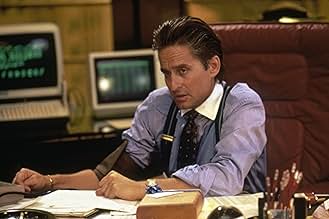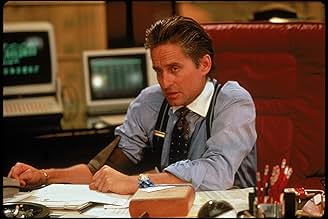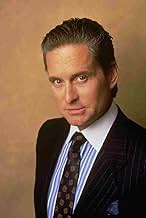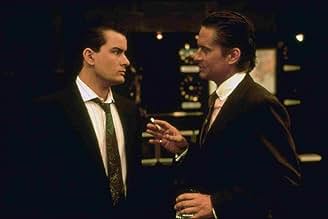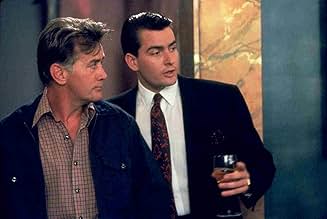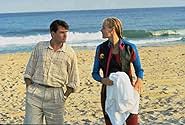An impatient young stockbroker is willing to do anything to get to the top, including trading on illegal inside information taken through a ruthless, greedy corporate raider who takes the yo... Read allAn impatient young stockbroker is willing to do anything to get to the top, including trading on illegal inside information taken through a ruthless, greedy corporate raider who takes the youth under his wing.An impatient young stockbroker is willing to do anything to get to the top, including trading on illegal inside information taken through a ruthless, greedy corporate raider who takes the youth under his wing.
- Won 1 Oscar
- 9 wins & 4 nominations total
- Chuckie
- (as Chuck Pfeifer)
- Director
- Writers
- All cast & crew
- Production, box office & more at IMDbPro
Featured reviews
The film follows a low level day trader (Charlie Sheen) who strives to become a very powerful figure on Wall Street like his idol Gordon Geckko (Michael Douglas). To justify his rise to power, he uses his father (Martin Sheen) knowledge of the flight industry for his own personnel gains. He wants to get his foot into the door of the oily Geckko. Will he sell his soul for a quick buck? How far and fast will this rising star soar? To find these answers check out Wall Street.
This film was made immediately after Platoon. Stone made it clear that he wasn't going to let an Oscar winning malaise effect him. He explores the two fathers theme that he used in Platton and once again makes it work. A highly underrated film that has sadly been neglected by the mainstream audience. What makes it even sadder is the fact that it still applies today.
Highly recommended.
It will have to go some though to beat the shock and awe value of its prototype, with Douglas' larger than life personification of corporate greed, Gordon Gekko, dominating proceedings. Charlie Sheen is the young trader on the make, aiming to aspire, or so he thinks, to Gekko's status and success, trying so hard to please his idol that he not only ends up aping his appearance (slicked back hair, big suspender braces) but even betraying his idealistic union-man father by relaying insider knowledge on the latter's ailing airline employer to Gekko who then moves in to welsh on his workforce-friendly words to asset strip the company for massive personal gain. Sheen's Bud Fox character eventually has an epiphany, augured by the coincidence of real-life and cinema dad Martin copping a heart attack and turns on and indeed turns in his guru to the authorities to bring ultimate closure to the piece.
The film has its faults; I didn't quite buy into Douglas surrogate-father figure appeal to Sheen Jr., the coincidental heart attack of Sheen/Fox Sr is a bit too pat and some of the supporting characters come on like mere ciphers, including Terence Stamp as the UK magnate-cum-nemesis of Gekko and Daryl Hannah as a Gekko cast-off girlfriend/groupie who becomes young Sheen's trophy girl-friend. This leads to a larger criticism on the paucity of female characters in the film at all, but if you can accept that this is a man's man's man's world, to paraphrase James Brown, then this morality tale of its time still packs a punch, especially with the collapse of Communism and the surrender of the likes of Russia, China et. al to the addictive drug of big-bucks capitalism.
Stone's camera is constantly on the move, capturing the frenetic-ism of dealers on the trading floor as market frenzy takes hold, with the dialogue razor-sharp throughout, so many of the phrases of course having become clichés for that era, almost entering common parlance the language, such as greed is good, lunch is for wimps and more.
In the end, young Sheen would have done well to be careful what he wished for, but if he's the Little Red Riding Hood to Douglas' Big Bad Wolf, this particular out-sized fairy tale reaches its conclusion fittingly and satisfyingly, opening up a seamy, selfish world that you know is out there still, now more than ever.
There are two schools of thought when it comes to money. Some economists argue money is an expanding resource, and prosperity a rising tide that lifts all boats. For Gekko, the truth is simpler and more brutal: The rich get richer off the backs of everyone else. "Money itself isn't lost or made, it's simply transferred," he tells his young protégé Bud Fox (Charlie Sheen).
No question writer-director Oliver Stone feels the same way, as he presents this tale of wealth acquisition at its very apex, lower Manhattan circa 1985. In practically every frame showcasing the opulent world Gekko travels can be glimpsed beggars, fishermen, window washers, people who never will have access to the white-collar lifestyles their lowly status perversely enables for others.
For some, this zero-sum take of America clouds their enjoyment of "Wall Street" the movie. It shouldn't. You don't have to buy Shakespeare's version of history in "Richard III" to enjoy the morally bankrupt character at its center, and you don't need to adopt Stone's philosophy to enjoy Gekko.
In fact Stone's attitude about the Street, presented here as a kind of Hogarth caricature, helps make the film so entertaining. He captures the scenes of floor trading and calls and puts in journalistic detail, but leaves room for the human equation. And he has fun, a lot of fun, especially with Gekko, a character who makes you laugh with his pithy comments even as he sets about using poor Fox as a human ashtray.
On an upcoming charity event for the Bronx Zoo: "That's the thing about WASPs. They hate people, but they love animals." On a rival: "If he was in the funeral business, no one would ever die!" To Fox: "You had what it took to get into my office, sport, the question is do you have what it takes to stay."
Fox wants to stay, and allows no SEC regulation to block his wayward path. Stone's father was a stockbroker, and so the director takes special care to show us that all Wall Streeters aren't bad. There's Hal Holbrook, almost too saintly and somewhat detached from day-to-day business of his brokerage house to the point he seems a slumming B-school don. John C. McGinley delivers a standout performance as a vulgar, greedy friend of Fox's who we nevertheless find ourselves sympathetic to, especially as Fox ditches him for Gekko.
But of course it's really Gekko's world, as we watch him at his desk, punching telephone-line buttons and encouraging subordinates to "rip their throats out," checking his blood pressure with one hand while smoking a cigarette in the other. His centerpiece moment, his speech to the stockholders at Teldar Paper, is a compelling soliloquy not because it showcases his brutality but because it allows him a chance to explain his philosophy in a way that sounds logical, even honorable, until you think through the implications. That's Stone's screen writing at its best.
Sheen is also masterful in his role, playing the naive waif who wants to swim with the sharks and thus giving Douglas daylight to run. Too bad there's a tacked-on romance that never really works, in part because the character of Darien Taylor is not well developed, in part because Darryl Hannah hadn't yet met Quentin Tarantino. The ending is a bit too neat, and loses the subtlety that makes the rest of the film so good.
But the heck with subtlety when you have Gordon Gekko. Douglas is the reason for watching "Wall Street," and a terrific one. Just watch the way he looks at Bud, eyebrows raised to hold a pregnant silence, or enjoys the discomfort of his arbitrager-rival Sir Larry (a solid Terence Stamp). Stone knew what he had here, and makes the most of it. As a twisted morality tale, "Wall Street" is a thrilling, scenic ride down a dark and dangerous road.
Did you know
- TriviaIn the scene in which Bud Fox brings a birthday gift to Gekko's office, Gordon's secretary says 'Five minutes' in order to keep the unplanned meeting between Gekko and Fox as brief as possible. There are exactly 5 minutes in the movie from this moment to the moment in which Bud leaves the office.
- GoofsAt the beginning of the movie, Bud Fox and Marvin say Gordon Gekko was shorting NASA stock right after the Challenger explosion. The scene is set in May 1985, but the Space Shuttle Challenger exploded January 28, 1986.
- Quotes
Gordon Gekko: The richest one percent of this country owns half our country's wealth, five trillion dollars. One third of that comes from hard work, two thirds comes from inheritance, interest on interest accumulating to widows and idiot sons and what I do, stock and real estate speculation. It's bullshit. You got ninety percent of the American public out there with little or no net worth. I create nothing. I own. We make the rules, pal. The news, war, peace, famine, upheaval, the price per paper clip. We pick that rabbit out of the hat while everybody sits out there wondering how the hell we did it. Now you're not naive enough to think we're living in a democracy, are you buddy? It's the free market. And you're a part of it. You've got that killer instinct. Stick around pal, I've still got a lot to teach you.
- Crazy creditsBuilding illustrations are shown during entire end credits
- Alternate versionsIn the VHS release, instead of the correct 1981-1994 20th Century Fox logo, the 1953-1981 logo is used.
- ConnectionsFeatured in Siskel & Ebert: The Duxorcist/Walker/Manon of the Spring/The Dead (1987)
- SoundtracksFly Me to the Moon
Words and Music by Bart Howard (ASCAP)
Published by The Hampshire House Publishing Corp. (ASCAP)
Performed by Frank Sinatra
Courtesy of Reprise Records
By Arrangement with Warner Special Products
Arrangement by Quincy Jones (uncredited)
Details
- Release date
- Country of origin
- Official site
- Language
- Also known as
- El poder y la avaricia
- Filming locations
- 60 W. 75th St, New York City, New York, USA(Bud's first apartment building)
- Production companies
- See more company credits at IMDbPro
Box office
- Budget
- $15,000,000 (estimated)
- Gross US & Canada
- $43,848,069
- Opening weekend US & Canada
- $4,104,611
- Dec 13, 1987
- Gross worldwide
- $43,848,069
- Runtime
- 2h 6m(126 min)
- Color
- Sound mix
- Aspect ratio
- 1.85 : 1




